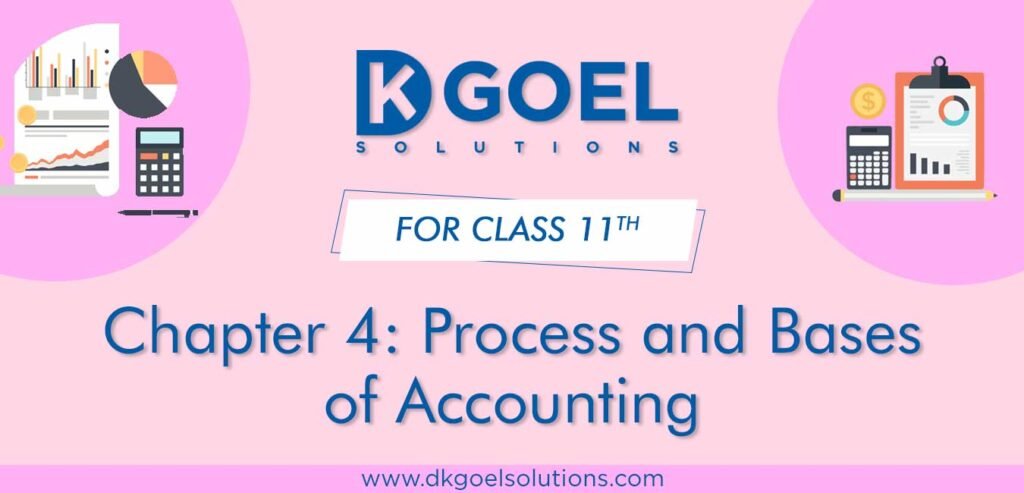DK Goel Solutions Chapter 4 Process and Bases of Accounting
Read below DK Goel Solutions for Class 11 Chapter 4 Process and Bases of Accounting. These solutions have been prepared based on the latest DK Goel Accountancy book issued for this academic year.
The book is really useful as it explains in detail the Process of Accounting, Cash Basis of Accounting, and Accrual Basis of Accounting, to the Class 11 commerce Accountancy students. It includes questions that are very well made and are very helpful to understand the concepts for Class 11 Accountancy for Students.
DK Goel Solutions for Class 11 Chapter 4 solutions are free and will help you to prepare for Class 11 Accountancy.
Process and Bases of Accounting DK Goel Class 11 Accountancy Solutions
Students can refer below for solutions for all questions given in your DK Goel Accountancy Textbook for Class 11 in Chapter 4
Question 1:
Solution 1: A company’s accounting process begins by defining the transaction of the company and then tracking, categorizing, and summarizing a business transaction, which assists with planning the remainder of the trial and the financial statement.
Question 2:
Solution 2: Cash basis entries in the book of accounts are made when cash is received or paid and not when the receipt or payment becomes due. Expenses are reported after they have been paid, as incurred.
For the financial year, the difference in net revenue and total expenditure reflects a company’s benefit or loss. Therefore, outstanding and prepaid costs and revenue earned in advance or accrued income are not included as the Cash Basis of Accounting is followed.
Question 3:
Solution 3: In accrual basis accounting revenues and costs are recognised in the period in which they occur rather when they are paid. In the accrual basis of financial revenue, as it is received or accumulated, it is reported as income.
Likewise, it would be reported as an expense if an expense has been incurred but payment has not been made.
The Accrual Accounting Basis is based on the idea of realization and termination and incorporates two fundamental concepts of accounting, i.e. the identification of income and the theory of matching.
Question 4:
Solution 4: Outstanding expenses are not recorded on cash basis of accounting.
Question 5:
Solution 5: The two advantages of accrual basis of accounting are.
1.) The accrual accounting basis is more scientific than the cash accounting basis, because most accountants favour the accrual accounting basis.
2.) The financial basis represents the real benefit or loss during the accounting period and is thus generally acceptable.
Question 6:
Solution 6: Accrual basis of accounting is recognized under the Companies Act, 2013.
Question 7:
Solution 7: Yes, GAAP is in violation of the cash foundation of accounting because it does not meet the accrual principle principles and guidance.
Question 8:
Solution 8: Below are the steps of process of accounting:-
1) Identifying the transaction- The first step in accounting is to recognize what documents are in the account books. Only such transactions, in monetary terms, are reported in the account books.
In books, any exchange that cannot be calculated in terms of money cannot be registered. Holding a voucher or an invoice as a piece of proof is mandatory for all financial transactions.
2) Recording – A expenditure can only be reported in the account books if it is treated as an economic occurrence that can be calculated in terms of money. When economic activities are defined and calculated in economic terms, they can be reported in monetary and historical terms in the accounting books.
3) Posting in Ledger – When financial transactions are reported in newspaper or subsidiary books, all financial transactions are categorized in a different room by grouping single-character transactions at one location. The ledger is an account book where, due to its purpose, all the transactions are registered.
4) Summarising the accounts – It is the accounting of the final process. We are able to prepare the trial balance and financial statement in this process.
It concerns the display of data and starts with the balance of ledger accounts and, with the aid of those balances, the planning of the trial balance. We will plan the balance sheet after the trial balance.

Process of Accounting reflects the complete procedure of a company’s accounting. It defines the entire spectrum of financial transactions, their tracking, recording, categorizing, and summarizing to prepare financial reports of the firm. This assists the firms to prepare better financial statements and cope up with losses or unwanted expenses.
Here are the steps that sum up to present the best accounting reports for a firm –
Identification of transaction – The initial step of the process of accounting is to analyze the type of transaction.
Recording – It is one of the prominent procedures to track the monetary and historical terms in the firm’s accounting books. Every expenditure or profit of the company must be efficiently recorded in the accounts book.
Summarizing the accounts – The final step of the process of accounting is to frame a trial balance sheet and financial statement for the company.
The cash basis of accounting refers to the tracking and recording of cash transactions. An income made in cash is recorded in the accounting books, and similarly, an expense in cash is added to the accounting records.
Here are the two advantages of accrual basis of accounting –
● The accrual basis of accounting brings a more scientific approach than the old-school cash accounting basis.
● This type of accounting is mostly acceptable as it highlights the actual loss or benefit during the accounting period.
The cash basis of accounting breaches the GAAP as it does not follow the accounting principles and the accrual basis of accounting.
Any outstanding expenses are not recorded in the accounting book in the case of cash basis of accounting. It only records the payments made in cash.
